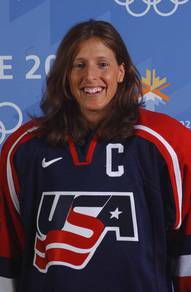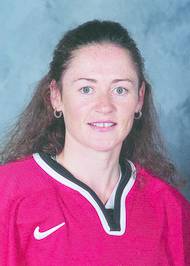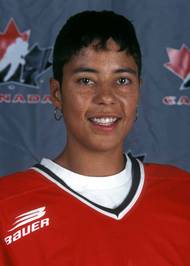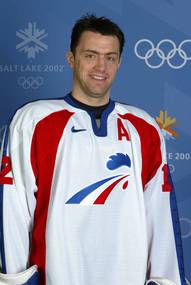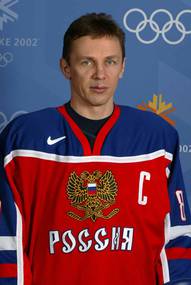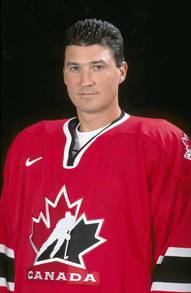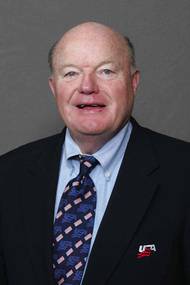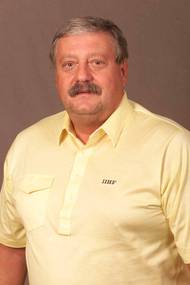

Women pioneers highlight IIHF class of 2008 |
 Back Back |
|||
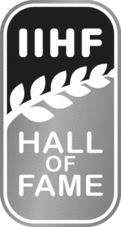
2008 IIHF Hall of Fame InducteesPlayer’s Category:Cammi Granato, United States
Cammi Granato’s career began in Illinois where she played with her siblings and later joined a boys’ team because there were no teams for girls in her area. Years later, she would become the most well-known female hockey player in America.
Granato is the all-time leading scorer in major international competition and was the player who defined U.S. women’s program during her 15-year career. She played in every IIHF World Women’s Championship and Olympics from the inaugural championship in 1990 until 2005, the year she led the U.S. to its first World Championship gold, denying Canada’s quest for a nine-in-a-row.
Granato was instrumental in USA’s historic gold medal at the 1998 Olympics, the first time women’s hockey was a medal sport. Granato earned the honour of carrying the U.S. flag at the Games’ Closing Ceremonies. In total, Granato won two gold and nine silver medals in eleven tournaments with the USA and was a role model and hero who played a key role in the growth of women’s hockey in the U.S. In official events, Granato played 54 games, scoring 54 goals and 96 points, both all-time records for women’s hockey.
In 1992, she was voted best forward by the IIHF Directorate, and three times she was named to the tournament All-Star Team (1992, 1997, 2002). She was honoured with the NHL’s Lester Patrick Award in 2007 for outstanding service to hockey in the U.S. Geraldine Heaney, Canada
Geraldine Heaney began her unprecedented career with the Beatrice Aeros club of Toronto when she was 13. Her European heritage helped hone her natural athletic skills, having played soccer, basketball and Gaelic football, which combined with her competitiveness, made Heaney a dominant defender every time she suited up.
Heaney became the first player in the world to win seven consecutive IIHF World Championship titles and she capped her amazing career with a gold medal at the 2002 Olympics in Salt Lake City, after which she announced her retirement. She also won the Olympic silver in Nagano in 1998.
During her club career, Heaney led Beatrice to numerous championships. She carried that success to the international stage, where she represented Team Canada as an anchor on defence for 125 games. Her 27 goals, 66 assists and 93 career points left her as the all-time leader in scoring for defencemen, ranking her fifth overall. Her 125 games is the benchmark for the Canadian women’s national team. Angela James, Canada
Angela James is considered the first true superstar of modern women’s hockey. James played for Canada in the first four officially-sanctioned IIHF World Women’s Championships, starting in 1990. She led Canada to a gold medal in all four championships, most notably at the inaugural event on home ice in Ottawa in 1990, when she scored a record eleven goals in five games and established herself as the team’s great offensive threat.
In 1992, she helped Canada beat USA, 8-0, in the gold-medal game, which still stands as the most lop-sided final score in women's hockey history. James also played for Canada in 1994 and 1997. In total, she scored 22 goals and 34 points in just 20 career games at the World Women’s Championship, and in 1992 she was named to the tournament All-Star Team. James was just as successful on the national stage, winning more than a dozen medals and eight MVP awards at the Canadian national women’s championships during her career, In addition to being a dominant player, James was an idol and the inspiration for the next generation of Canadian players that included Hayley Wickenheiser and Cassie Campbell.
Today, James is the owner of the Breakaway Adult Hockey School and director of the women’s hockey school at Seneca College. Philippe Bozon, France
The name Bozon is synonymous with French hockey. Father Alain was the first family member to represent the French national team on the ice. Son Philippe followed in his father’s footsteps and soon became the best-known hockey player in French history. During his long and illustrious career with the French national team, Philippe participated in four Olympic tournaments and another 12 IIHF World Championships, where he averaged just over one point per game.
Focused on a professional career, Bozon left France at a young age and played for three seasons for the St. Jean Beavers in the Quebec Major Junior Hockey League and in the 90s, Bozon broke down a major barrier, when he became the first Frenchman to play in the NHL. He played 163 games with St. Louis from 1992-95. In the French League, Bozon was named the best player in 1989 and the rookie of the year in 1984. He won three French Championships in 1984, 1988 and 1991 and then moved onto Germany, where he won another three titles in one of Europe’s premiere leagues with Adler Mannheim from 1996-99. Bozon ended his 22-year career in 2006 and is now a youth hockey coach with Switzerland’s Geneva Servette. Igor Larionov, Russia
Igor Larionov will forever be remembered as the versatile pivot on what many consider as the best five-man unit to play the game, with wingers Sergei Makarov, Vladimir Krutov and defencemen Vyacheslav Fetisov and Alexei Kasatonov. It was this unit that propelled the Soviets on the international scene for a full decade.
In total, Larionov won two Olympic gold medals (1984, 88), four IIHF World Championship gold medals, one Canada Cup title (1981) and one IIHF World U20 gold medal (1980). At the age of 41, Larionov captained Team Russia to Olympic bronze in Salt Lake City and he also represented his country in the 1984 and 1987 Canada Cups and the 1996 World Cup of Hockey.
In his 27-year professional career on both sides of the Atlantic (13 in Europe, 14 in the NHL), Larionov played 1378 games, scoring 373 goals and 705 assists for a total of 1078 points. He collected eight Soviet Championships with CSKA Moscow, and three Stanley Cups with Detroit.
Individually, Larionov was selected to the World Championship first All-Star Team in 1983 and 1986. He collected 36 goals, 53 assists for 89 points in 105 international games. He was on the USSR league All-Star team in 1983, 86, 87 and 88 and was named USSR player of the year in 1988. He is one of 19 members of the Triple Gold Club, for players who have one Olympic gold, World Championship gold and the Stanley Cup. Mario Lemieux, Canada
Mario Lemieux was a world class player in every one of his international appearances. It started at the 1983 IIHF World U20 Championship where he had 10 points in seven games. As a 19-year-old, he scored another 10 points in as many games at the 1985 World Championship, leading Canada to their first win over the Soviet Union in 24 years. At the 1987 Canada Cup, he amassed an unbeatable 18 points in nine games and was during that period considered as the best offensive force in all of hockey. The one-two punch with Wayne Gretzky at that tournament reached mythological proportions.
As a 37-year-old, Lemieux won the Olympic gold medal in 2002, leading Canada to its first Olympic hockey gold in 50 years. He had six points in five games as team captain of Canada. He closed his international career by winning the 2004 World Cup of Hockey, captaining by example with five points in six games.
Along the way, Mario Lemieux captured the hearts of most ice hockey fans around the world. He scored over 1700 points as a member of the Pittsburgh Penguins and won two Stanley Cups, six NHL scoring titles, three Hart Trophies as league’s MVP, a four time MVP voted by the players, two playoff MVP trophies, he was voted Rookie of the Year in his first year in the NHL among many other awards during his years with the Penguins. Builder’s Category:Art Berglund, United States
Art Berglund’s career in international ice hockey spans portions of five decades, during which time he has managed or served on the administrative staff of more than 30 U.S. teams in a variety of tournaments worldwide. Berglund served as USA Hockey’s director of national teams and international activities for 11 years before being named senior director of international administration in 1996.
His start in international ice hockey came soon after his graduation from Colorado College in 1963, where he was the leading scorer for the Tigers during his senior season. Former IIHF President William Thayer Tutt immediately put Berglund’s skills to work at the famous Broadmoor World Arena. At the end of his 13 years there, Berglund had enough experience to manage the United States National Team from 1973-75 as well as the General Manager of the 1976 U.S. Olympic squad and later again in 1988.
Until 1992, Berglund was the General Manager with the U.S. Junior Team eight times along with the Men’s National Team from 1985-91. Berglund helped engineer a silver medal for the U.S. at the 2002 Olympics. He received the NHL’s prestigious Lester Patrick Award in 1992 for outstanding contributions to the sport of ice hockey in America. Berglund retired from his job at USA Hockey on June 30, 2005, but still serves as a consultant. Paul Loicq Award(for special contributions to international hockey)
Juraj Okolicany, Slovakia
Okolicany has a career in officiating dating back to 1962 and he was an active referee for a quarter of a century before he retired in 1986. Between 1973 and 1985, he was an IIHF licensed referee, working four IIHF World U20 Championships and two B-pool men’s World Championships.
His major accomplishments as an omnipresent personality on the international scene started in the early 90s when he became one of the IIHF’s top referee supervisors for all major events. Okolicany has worked 10 IIHF World Championships, two Olympic Winter Games and around 45 minor IIHF championships as a supervisor.
He combined those duties with several assignments as manager of the Slovak national team in the World Championships (1996 and 1997) and Olympics (1994, 1998). He was also an Event Director for the organizing committee from 1993-2003 for 12 IIHF competitions held in Slovakia
Okolicany has been a member of the IIHF Referee Committee since 1998 and he was with the IIHF Junior Committee between 1993 and 1998. |
||||
 Back Back |
||||





